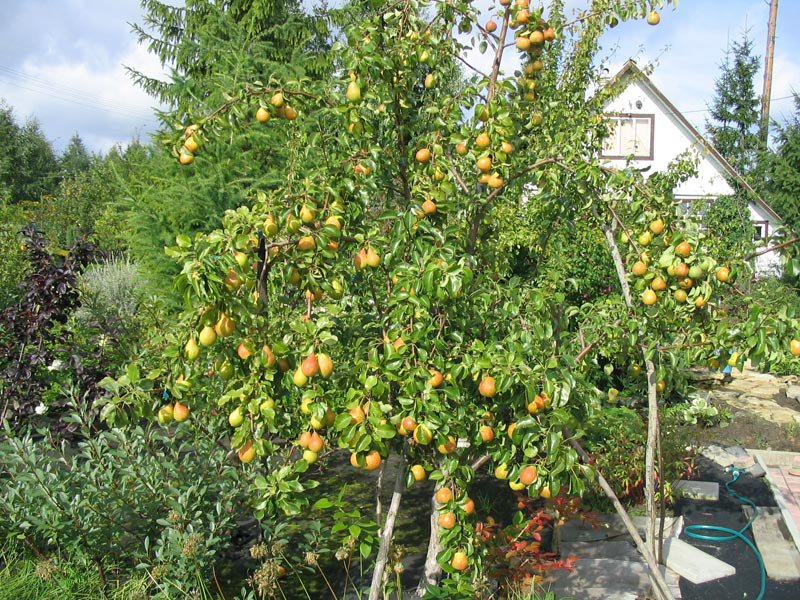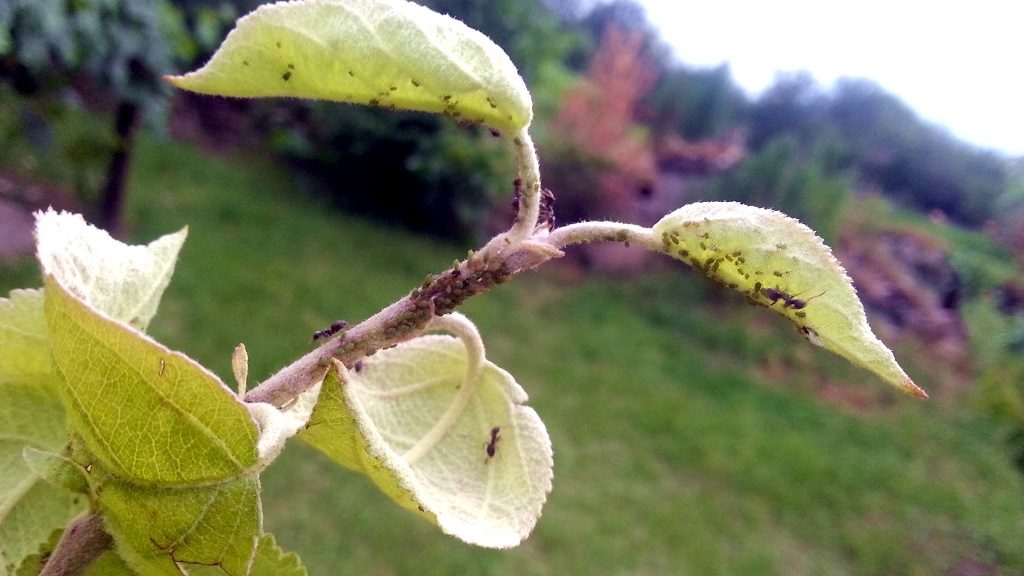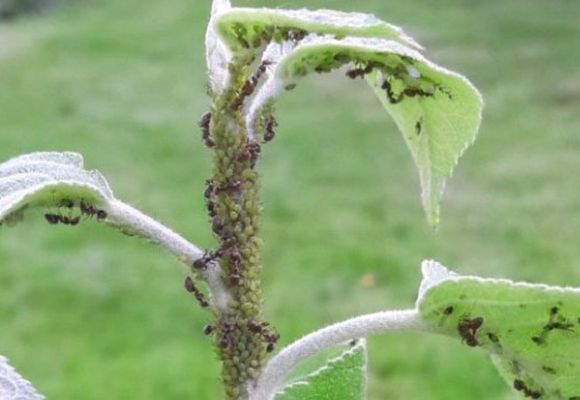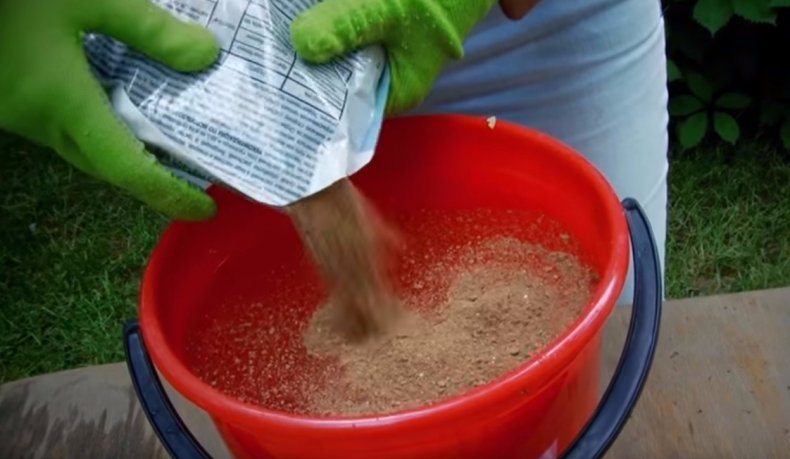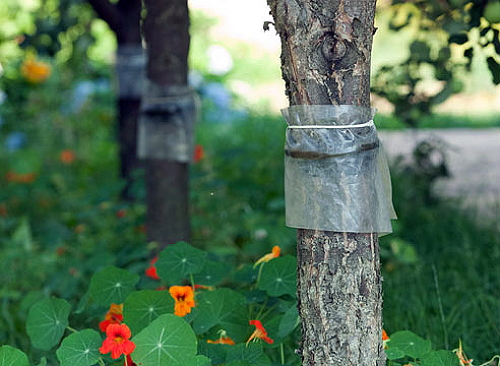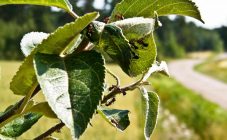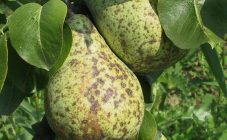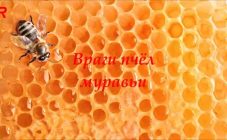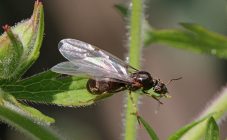Content:
Ants are useful garden insects, however large numbers of black ants can harm the plants in the area. What are the harmful ants that settled on the pear, how to get rid of them using chemical and plant agents will be described below.
What harm can ants do to a pear?
Black ants settle on the site in large colonies. Building passages, collecting insects for food, they carry seeds, including weeds. The main trouble created by these insects is the reproduction of aphids: the fact is that aphids serve as their main food, and with its appearance on the pear, black workers will immediately appear, they will also contribute to its reproduction in order to store the larvae and feed on its sugary secretions. Aphids, in turn, suck the juices from the buds and young shoots, which begin to dry out.
Ants can harm pear seedlings and the buds of mature trees. Do not mind eating ripe sweet pears, especially if they fell from the tree to the ground. Large colonies can infect the root system of a young plant.
What to do with a large anthill?
Insects can destroy an old pear tree by settling in a hollow or in a crack on the trunk, carpenter ants are especially dangerous. If they are wound up in a hollow, the recess in the trunk must be cleaned, treated with the Anteater and repaired.
Anthills around the trunk of a pear should be collected with a shovel in a bucket and carried away from the garden area. The place where they were can be spilled with boiling water several times - the queen often continues to live in the ground at great depths, which means that new insects will quickly come into the dwelling.
If insects have chosen a place under the roots of a tree, especially a seedling, it can die in a few years due to excessive loosening of the earth and, consequently, lack of moisture. Such a tree needs to provide abundant watering.
Ants on a pear - what to do?
Chemicals
Granular preparations Barguzin, Thunder, Medvetoks, Muravyin are effective, acting on insects as intestinal poison. If the anthill is in the immediate vicinity of the tree and has already reached a large size, it is better to fall asleep in these preparations in the fall - this way they will have time to be inactivated and will not be absorbed by the root system, and will not get to the pear fruits. The soil should be treated with granules in the doses indicated in the instructions.
When opening the leaves, the pear can be sprayed with the preparations Decis, Inta-Vir, Iskra.
Gels, for example, Great Warrior, Raptor, Fas, Storm, have proven themselves well. The gel is squeezed out under the tree, as close to the anthill as possible. Its scent attracts ants, and they carry it on their paws around the colony. The substance is toxic, most of the active substances destroy the chitinous cover of insects and after a few days they die.
Aerosols and sprays often only kill a small part of the population, but never act on the queen.
In spring, pears can be sprayed with a 3% solution of Bordeaux mixture or ferrous sulfate - this procedure serves to prevent fungal diseases and aphids. Processing should be carried out in dry, calm weather.
To scare off ants, you need to deprive them of their natural food - aphids. To do this, the pear is treated three times a year with one of the drugs: Fitoverm, Iskra, Agrovertin, Fufanon. With the exception of Fitoverm, these funds are quite toxic, so it is not recommended to take them in the summer, when the tree is with fruits.
Biological agents
These remedies are somewhat less effective than chemical ones - garden ants quickly develop immunity. But a group of these substances can be used when fruits ripen - they are not toxic to humans. Almost all the funds of this group are aimed at combating aphids - an intermediary in the infestation of a tree by ants.
One of the proven remedies is a soapy solution of tobacco (soap is used to make the substance sticky and stay on the plant longer). But it will be difficult to spray or coat a large, heavily affected tree with it - it is more expedient to apply it to dwarf pears or to small insect colonies. The infusion of coniferous concentrate has the same effect - it is prepared at the rate of 35 g of needles per 10 liters of water.
Tansy, calendula, marigolds, onions and garlic repel pests - these plants can be planted near the pear to save the tree. Another way is to rub the tree trunk with a decoction of garlic or wormwood. The disadvantage of this method is that the insects will leave the pear, but will find another place for the house on the site.
Mechanical wood protection
One of the ways to fight ants less bloody is to scare them away. Mechanical means are a variety of traps and trapping belts that are attached to the tree trunk and do not allow climbing over it, protecting the shoots and fruits of the pear.
Garden shops sell special protective adhesive belts (for example, Aeroxon). They are wrapped around a tree in early spring, around the end of March, when the snow has almost melted and the trunks have sufficiently exposed. The belt is fixed at a height of 60-80 cm, it helps to fight not only ants, but also the codling moth and other pests.
Foil belts can be used for protection. It is necessary to wrap the foil around the trunk at a height of about 80-100 cm from the ground so that the edge of the foil is inclined and sharp - insects cannot overcome it. It is important that the foil fits snugly against the bark and the ants cannot crawl under it. In the same way, you can build a belt from a small metal plate: fix it on a tree trunk in the form of a funnel (cone), having coated the junction of the funnel with the tree with plasticine so that the ants cannot overcome the obstacle.
The trunk circle can be sprinkled with quicklime or soda and dug up - this should also scare away uninvited guests.
Another way is to coat the tree trunk with a mixture of ash and clay - the ash repels insects.
The benefits of ants in the garden
- destroy harmful insects;
- loosening and aeration of the soil;
- attract birds, serve as one of the sources of their food;
- spread the seeds of some plants (however, in the constant struggle of the summer resident with weeds, this is not an unambiguously positive property of the insect).
When exterminating insects, it is worth making an exception for red ants - they are predators and are extremely useful in the garden.
Knowing how to process the paths of ants on a pear, you can quickly get rid of an unpleasant neighborhood.
